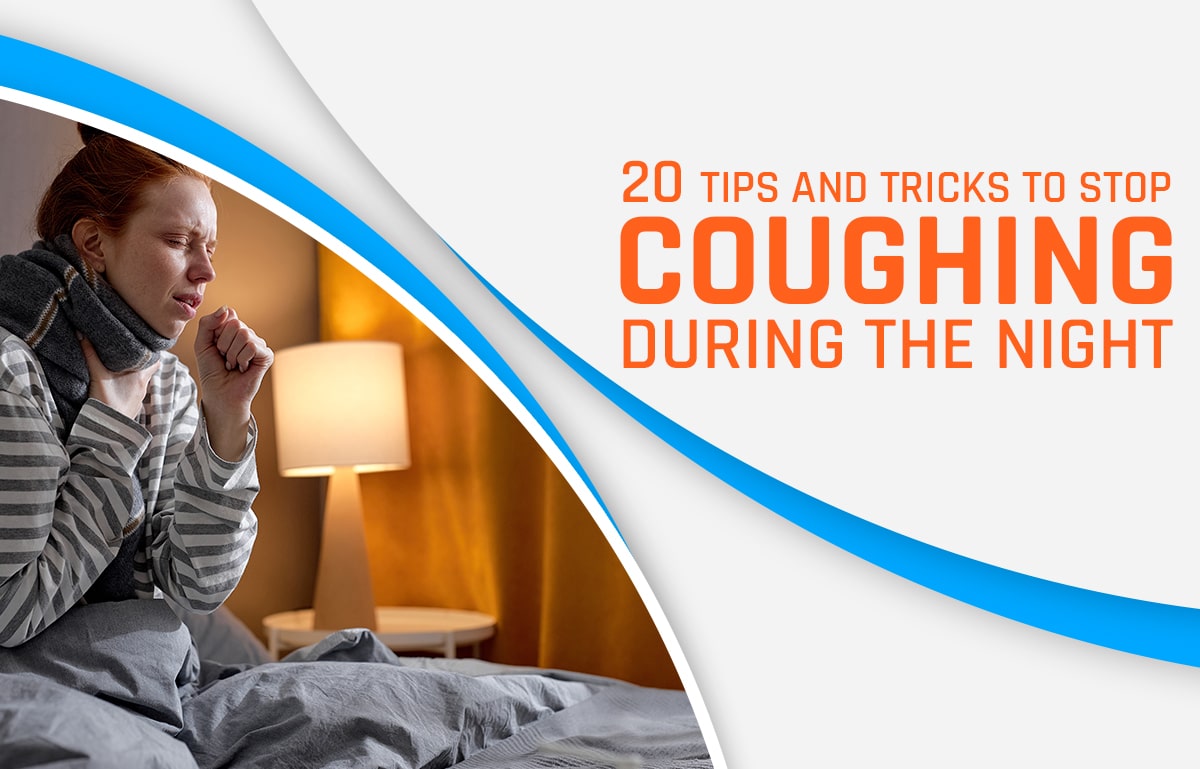
Does your cough get worse during the night? Well, this happens when you lie down for taking some rest. There are natural and effective remedies to prevent cough in the night which include – raising your head and taking honey. But certain causes will require medical treatment.
Nighttimes coughing can be very irritating to your throat and may intensify into a severe coughing episode, disrupting your sleep for extended periods. It can be the reason for sleep disruption, affecting how you feel throughout the day. Read on to know why night-time coughing occurs for some tips on how you can stop it.
What can cause coughing?
Coughing is the way your body eliminates the airways and lungs of invaders. It is a reflux reaction occurring from the irritants such as – smoke, dust, mucus or pollution entering your body.
Some causes of coughing at night can result from bacterial or viral respiratory infections such as – whooping cough, croup and pneumonia.
These infections may lead to inflammation that thickens and increases natural mucus in the body. This extra mucus can cause coughing.
Allergies and asthma can lead to coughing due to inflammation.
Other common causes include:
- damage to vocal cords
- upper or lower respiratory infections
- gastroesophageal reflux disease (GERD)
- lung disease
- sleep apnea
- heart failure
- take certain medications
People who are addicted to smoking have greater risk of chronic obstructive pulmonary disease (COPD), including emphysema and severe chronic bronchitis. COPD can lead to coughing and destruction of lung tissue.
How to stop coughing
Coughing is a natural mechanism your body uses to get rid of unnecessary substances into your airways. If you want to stop your cough when it happens, then this will not provide a long-term solution. Make sure you address the underlying cause behind it.
Here are 20 tips on addressing the exact cause of your cough.
Avoid allergens
You need to avoid allergens such as pollen and dust for coughing in people with allergies and sensitivities. If you do not know about an allergy, then you should consider with the healthcare provider or try out at-home allergy testing.
Eliminate dust from home
Keep your house clean from common allergens such as – dust, dust mites, and pollen to lessen the risk of coughing.
Some tips to keep irritants at bay are the following:
- vacuum daily
- wash linen and curtains often
- swap carpets and rugs for solid floors
- select blinds over curtains
Use air filters to make bedroom allergy-proof
A HEPA air filter can help to mite-proof your bedroom.
Other strategies are the following:
- wash bedding in hot water once in a week
- use allergy covers for mattresses, pillowcases, box springs and duvets to lessen and avoid dust mites
- keep pets out of the bedroom
Manage asthma
Asthma causes airways to become inflamed. Having dry cough is a common symptom of asthma. If your cough is dry and you sometimes have difficult time in breathing, then you need to consult with a doctor or healthcare professional. You may need a prescription inhaler for treating asthma.
Shut windows
This can lessen the possibility of getting cough when the pollen counts are higher or when there is lots of dust blowing around.
Avoid polluted areas
Having exposure to pollution is a common sign for coughing. As per research, more than 90 percent of the population gets exposed to polluted air every year. But if you are having constant cough, then take extra care by taking proper medication.
Deal with GERD
GERD is a severe cause of acid reflux as well as nighttime coughing.
Some tips to deal with the symptoms of GERD are the following:
- visit a doctor for different medications
- maintain a diary to identify foods that can make symptoms worse
- follow the advice given by your healthcare provider
Incline your bed
Lying down makes it easy for stomach acid to flow back into the esophagus. You need to wait for at least 2.5 hours after eating to lie flat. It can help to raise the head of your bed by 6–8 inches.
People having GERD are the only one who can benefit from sleeping at an incline. Elevating the head at night can manage many types of cough.
It is easy for the irritants to make their way to throat and trigger coughing when you lie down. Ways of doing this include investing in adjustable bed or mattress and using wedge pillows.
Destroy cockroaches
The feces, body parts and saliva of cockroaches can cause coughing and other symptoms of allergy.
You can prevent cockroaches in your house by:
- sealing food containers so they remain unattractive to cockroaches
- remove newspaper and magazine piles that attract dust and give cockroaches places to hide
- hire an exterminator to get rid of an infestation
Use a humidifier
Warm air can dry out airways, throat and make you highly prone to coughing fits. Many people find their cough gets worse when they turn on their heater in the winter. Running a humidifier for cool mist can keep the air in bedroom and throat moist.
Seek treatment for sinus infection
Sinus infections can be the reason for postnasal drip, especially when they are lying down. This may tickle your throat back and cause coughing. Prescription antibiotics will clear up a sinus infection and stop the cough and the drip.
Use a neti pot
A neti pot can wash out nasal passages to relieve congestion. Make sure you follow the instructions carefully, as incorrect usage can increase the risk of further infections
Eat honey
Indigest 2 to 3 honey teaspoons before your bedtime to loosen the mucus in your throat. Another option is mixing 2 teaspoons of honey into a caffeine-free tea like herbal tea.
Sip lemon juice
Lemon juice contains anti-inflammatory properties. You can mix little amount in water to get rid of a cough till you do not have GERD. Combine many ingredients in hot drink with warm water, lemon juice, honey and ginger.
Try pineapple
Bromelain is an enzyme found in pineapples that thin out mucus and reduce coughing. Try eating pineapple or drinking pineapple juice.
Gargle salt water
Gargling with a saltwater solution can clear out airway congestion and stop coughs due to allergies, asthma and infections. Prepare a saltwater by adding half teaspoon of salt and 8 ounces of warm water.
Take decongestants for a cold
Common cold can cause coughing. Taking lots of fluids can help you to feel better. If your cough gets severe and you are an adult or a child older than 6 years, cough medications and decongestant sprays may help.
Try over-the-counter medication
Over-the-counter (OTC) cough remedies can manage coughing in different ways. Cough suppressants reduce the urge to cough while taking expectorants will thin mucus and make it easy to cough up. Ask a healthcare provider to choose a medication that will treat your cough.
Get your shots
Taking vaccine can help to avoid flu and prevent the viral infections that lead to coughing.
Avoid smoking and tobacco
Severe cough is a common side effect of smoking for long term or exposure to second-hand smoke. Quit the habit of smoking or ask smokers not to smoke to improve cough and overall health. Talk with a healthcare professional if you smoke and want to quit.
What you should do when coughing becomes severe
Most coughing stops in sometime though persistent and severe nighttime coughing can be a sign of serious condition, such as:
- pneumonia
- bronchitis
- COPD
- lung cancer
- persistent or severe cough requiring medical attention
- heart failure
When you need to see a doctor
You should seek medical help when you have a cough and:
- a fever of 100.4°F (38°C) or more
- choking
- wheezing
- swelling in your abdomen, ankles or legs
- blood in phlegm or cough up blood
- shortness of breath
- chest pain
- increasing amounts of phlegm
Other tips about getting medical help are the following:
- see a doctor when there is persistent cough and does not go away or gets worse
- complete any antibiotics course to treat bacterial infection even when the symptoms improve
- seek help if a cough disrupts your daily life, sleep and overall well-being
- follow any treatment plan as suggested by the doctor
- go back to the doctor when any medications seem to make the cough worse
Many things which cause a daytime cough can also lead to a nighttime cough.
But a cough can get worse during the night due to sleeping position, exposure to pollen, dust, mites from bedding and quality of air in bedroom.
Whatever might be the cause, there are effective home remedies and lifestyle measures to relieve a night time cough, such as:
- use pillow to elevate your head
- elevate your mattress
- invest in a humidifier
- wash bedding
- vacuum floors
- keep windows shut due to air pollution or high pollen
You may take over-the-counter medication or seek medical help for prescription cough medication for any underlying condition. Thus, visit www.gp.london to book a consultation with our private GP today and get the right treatment on time.



-min.jpg)

